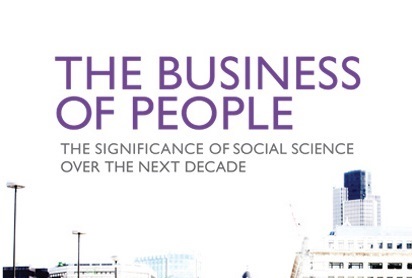24 February 2015 saw the launch of a major new report, written by the Campaign for Social Sciences (CfSS) and published by SAGE, which highlights the value of social sciences to the UK economy and society. Since our founding 50 years ago, the social sciences have played a core part in both our publishing vision and mission, with SAGE being a strong advocate for both their value and impact on research and society.
Speaking of the report’s publication SAGE’s Global Publishing Director Ziyad Marar remarked:
“This initiative makes a tremendous contribution to the debate around the value of social science which needs to be highlighted ahead of the General Election and subsequent Autumn Spending Review. The impact of social science research is often misunderstood or narrowly construed and The Business of People will be pivotal in helping to ensure that the true significance of social science to our economy and society more generally is widely understood. We at SAGE are delighted to have worked so closely with the Campaign to publish this timely report, and on a personal front, I was proud to be part of the working group involved in its drafting.”
 This spring, from Athens to Aberdeen, knowledge and understanding derived from social science are salient and pertinent. From how to manage public finances and reshape taxation and spending, to boosting productivity and returns to skill, and measuring and comprehending inequality: the list is extensive.
This spring, from Athens to Aberdeen, knowledge and understanding derived from social science are salient and pertinent. From how to manage public finances and reshape taxation and spending, to boosting productivity and returns to skill, and measuring and comprehending inequality: the list is extensive.
UK parliamentary elections in May will be followed by a spending review. Over the coming months, constitution and governance will intersect with such "existential" questions as the UK’s continuing membership of the European Union, and its territorial integrity and migration.
Add intergenerational justice, gender and sexuality, regional instability, terrorism, online data and, last in this sequence but evidently not least, climate change – where understanding attitudes and behaviour is as challenging as the physics. All these are first-order questions for social science.
That’s the context for the report published by the Campaign for Social Science.The Business of People: The Significance of Social Science over the Next Decade pivots on two lines of argument. The first is that today’s (and tomorrow’s) research challenges demand multidisciplinary attack, with social science on the front line. Whether it’s the digital economy, energy, food security and lifelong health and wellbeing – or climate change or inequalities – no theme can be addressed through a single body of knowledge or individual discipline, certainly not just by ‘science’ as it used to be, narrowly, defined.
Progress requires diversity of knowledge, in which understanding markets, behaviour and attitudes (towards new products and processes) matches technological and research breakthroughs. As Sir Mark Walport, the Government Chief Scientific Adviser, put it in his annual report for 2014: as we learn how to modify our physical environment we build social and economic structures, and we must invest in understanding their sustainability.
The second line of argument foregrounds innovation and economic (or, more specifically, productivity) growth. Innovation in the life and physical sciences and in software and machines depends on parallel innovation in socio-economic processes for its application and exploitation.
New ways of working, of engaging staff, of firing the imagination of producers, entrepreneurs and consumers are invaluable in a service economy such as the UK’s. They are the province of social science.
Many people still conceive innovation as technological change, rather than in organisational or social terms. But the idea of social innovation is catching on. Better understanding of how the science and innovation system contributes to economic success, and increased recognition of the complexity and connectivity in the commercialisation process have led to a more holistic and multidimensional approach to policy-making.
Take infectious disease, which must be fought down parallel tracks: in laboratories and field trials at the same time as through better understanding of kin networks, hygiene habits, why states fail and ethnicity (to name only a few dimensions).
That feeds into the broader civic and democratic argument for social science investment. Just as big tech companies such as Google are now recruiting chief social scientists, so government needs to mobilise understanding of human systems, behaviour and socio-economic dynamics.
We call for an increase of 10 per cent in real terms for the science and innovation budget – and these extra funds to be dedicated to work joining the perspectives of the physical and life sciences with those from social science, the arts and humanities. Collaboration across the disciplines is vital. Social scientists are developing a new “science of innovation” – to ensure new machines, new products and services are picked up and applied, inside companies and organisations. A precondition for that is deeper understanding of attitudes, behaviour, incentives, yes, and “culture” and history, too.